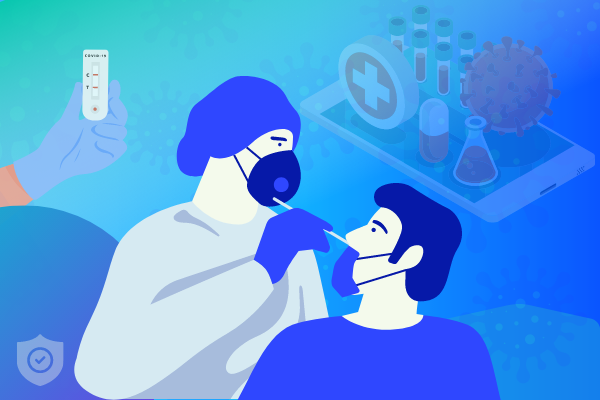As with numerous other adjustments to our daily lives in the era of COVID-19, the vague notion of rapid antigen testing has become embedded in the cultural zeitgeist. People hear the term and have a general understanding of what the tests entail, but aren’t necessarily fully aware of what they are or precisely how they work.
What follows here are the detailed explanations for both of those questions and more that will hopefully enlighten business owners and employees as to why exactly rapid antigen testing should become a staple of any back to work plan.
Table of contents
- What is a rapid antigen testing kit?
- How rapid testing antigen kits work?
- Antigen vs. PCR testing
- How to acquire them for free
What is a rapid antigen testing kit?
Rapid antigen testing kits provide the resources necessary when used regularly alongside personal protective equipment to screen and therefore reduce the risk of outbreaks from potentially asymptomatic or pre-symptomatic employees as they go back to work. This is a supremely useful tool, as it is believed that up to 50 per cent of COVID-19 transmission may be caused by individuals without obvious symptoms (per canada.ca).
In preventing potential outbreaks from occurring, rapid antigen tests slow the overall spread of COVID-19; keep employees, families and communities safe; and aid in the reopening of the economy both for the province and country at large.

How rapid testing antigen kits work
Tests can be conducted (at a rate of 1-2 times per week) via a straightforward nine-step process that is both safe and fast, providing results within 15 minutes of completion.
Following the administration process and the 15-minute waiting time, screening results will need to be interpreted. There are three possible results: Negative, presumptive positive and inconclusive.
In the case of a negative test result, the individual must continue to follow all local public health measures and continue to get tested regularly. This is partially because the accuracy of a test can vary depending on when the sample is taken, sometimes leading to false negatives.
In the case of a presumptive positive test result, the individual must seek a polymerase chain reaction (PCR) test to confirm the diagnosis and continue to follow all local public health measures as well as isolation and quarantine advice.
In the case of an inconclusive test result, the individual may be re-tested by their health care provider.
When looking to dispose of the used tests, they can be delivered to an appropriate disposal site, a hauler can be called, or Facedrive’s Safe Disposal Program can be used, which can again be accessed online through the website’s rapid test portal.
Antigen vs. PCR testing
While both rapid antigen tests and polymerase chain reaction (PCR) tests are necessary in the detection and prevention of COVID-19, they often get conflated with one another, ultimately causing people a lot of confusion.
But there are clear differences: Rapid antigen tests detect specific protein fragments related to the novel coronavirus. These tests are highly versatile, and thus can be used in almost any location, including offices. Results from these tests are quick (which is why most people simply refer to this as “rapid testing”), and can often produce results within 15 minutes.
Polymerase chain reaction tests, on the other hand, detect genetic material that is specific to the coronavirus, and thus are generally more accurate than their counterpart. However, they aren’t as flexible or fast, and usually require people to go to clinics. Results for these tests generally take up to 2-3 days to turn around.
Thus, bringing rapid antigen testing kits into the office is one of the easiest ways to keep employees safe, as they are the swifter of the two, but using both in tandem should be part of any return-to-work plan.
How to acquire them for free
Rapid antigen testing kits are available for purchase at local retailers such as Shoppers Drug Mart, but they are rather pricey. A single kit bought there can cost the customer around $40 CAD.
In an effort to help businesses and make these tests more accessible, Facedrive is providing these kits (thanks to the Government of Canada, who are offering them for free) to all small-to-medium-sized companies. Those interested can head to the Facedrive portal (https://rapidtest.facedrive.com), where tests can be ordered and refilled, and results can be reported.
So, not only are rapid antigen testing kits one of the fastest ways to detect and prevent COVID-19 outbreaks, but they are being made available for free. There are few better ways to begin protecting your business immediately.